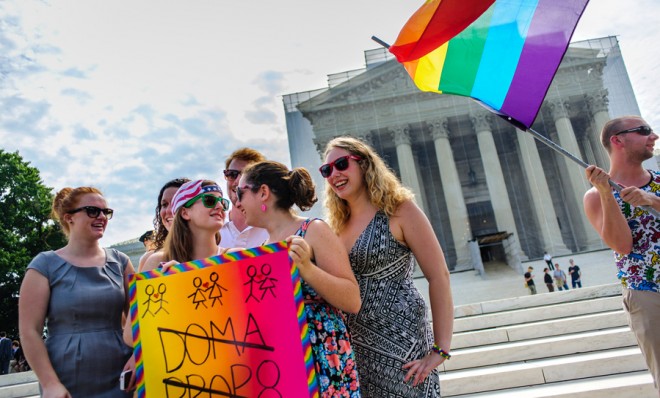What today's Supreme Court rulings mean for the gay community
Same-sex couples took a big step toward full marriage equality after two high-profile SCOTUS decisions

A free daily email with the biggest news stories of the day – and the best features from TheWeek.com
You are now subscribed
Your newsletter sign-up was successful
On Wednesday, the Supreme Court ruled on two cases with big implications for the gay community. The first involved the Defense of Marriage Act (DOMA), which was ruled unconstitutional by a vote of 5-4.
The second concerned Proposition 8, the ban on gay marriage approved by California voters in 2008. The Supreme Court ruled that an initial trial court's decision that the ban was unconstitutional stands.
So what do these decisions mean for same-sex couples around the country? A guide:
The Week
Escape your echo chamber. Get the facts behind the news, plus analysis from multiple perspectives.

Sign up for The Week's Free Newsletters
From our morning news briefing to a weekly Good News Newsletter, get the best of The Week delivered directly to your inbox.
From our morning news briefing to a weekly Good News Newsletter, get the best of The Week delivered directly to your inbox.
Defense of Marriage Act (DOMA)
The court's ruling on DOMA is the one that's more clear-cut and wide-reaching. Simply put, the federal government now recognizes gay marriage, and married same-sex couples can now qualify for federal benefits.
The case, United States v. Windsor, was a lawsuit originally filed by Edith "Edie" Windsor, who was forced to pay $363,053 in inheritance taxes after her partner of more than 40 years, Thea Spyer, died in 2009. Because federal law at the time did not afford the couple — New York residents who were married in Canada in 2007 — the same benefits as heterosexual married couples, Windsor was forced to pay even though a heterosexual widow or widower would not have to.
After today, same-sex couples will be able to leave an unlimited amount of assets to each other, without the burden of tax, just like straight couples can. They will also be able to jointly file taxes, receive Social Security benefits as a married couple, and receive the same tax break for workplace health coverage that other married couples enjoy.
A free daily email with the biggest news stories of the day – and the best features from TheWeek.com
The decision could also affect the current immigration debate going on in the Senate. Before Wednesday, a legal citizen couldn't sponsor his or her same-sex partner for a green card. An amendment to the Senate's immigration bill from Sen. Patrick Leahy (D-Vt.) tried to change that, but ended up almost derailing the bill.
Now, because of the Supreme Court ruling, it will be much easier for immigrants in same-sex marriages to become legal residents.
Still, the question of whether same-sex married couples will be able to receive spousal benefits in states that don't allow same-sex marriage or that don't recognize gay marriages that happened elsewhere, remains murky. The ability to sponsor a spouse traditionally depends on where a couple is married, not where they reside; Social Security survivor benefits are the exact opposite. Further legal action will likely be required before all federal benefits are available in all 50 states.
Proposition 8
This was a much narrower decision than DOMA. The Supreme Court ruled that Daniel Hollingsworth — who appealed a U.S. District Court's initial decision that Proposition 8 was unconstitutional — as well as other supporters of Prop. 8, did not have sufficient standing to appeal.
In practical terms, that means that gay couples in California should be able to get married in about 25 days, when the Ninth Circuit is first able to lift the hold on the injunction against Proposition 8. Gay marriage opponents, however, could still fight the injunction in court.
While a win for same-sex couples in California, the Supreme Court decision would have been more definitive if the justices had ruled that Proposition 8 itself, not just Hollingsworth's appeal, was unconstitutional.
Keith Wagstaff is a staff writer at TheWeek.com covering politics and current events. He has previously written for such publications as TIME, Details, VICE, and the Village Voice.
-
 The environmental cost of GLP-1s
The environmental cost of GLP-1sThe explainer Producing the drugs is a dirty process
-
 Nuuk becomes ground zero for Greenland’s diplomatic straits
Nuuk becomes ground zero for Greenland’s diplomatic straitsIN THE SPOTLIGHT A flurry of new consular activity in Nuuk shows how important Greenland has become to Europeans’ anxiety about American imperialism
-
 ‘This is something that happens all too often’
‘This is something that happens all too often’Instant Opinion Opinion, comment and editorials of the day